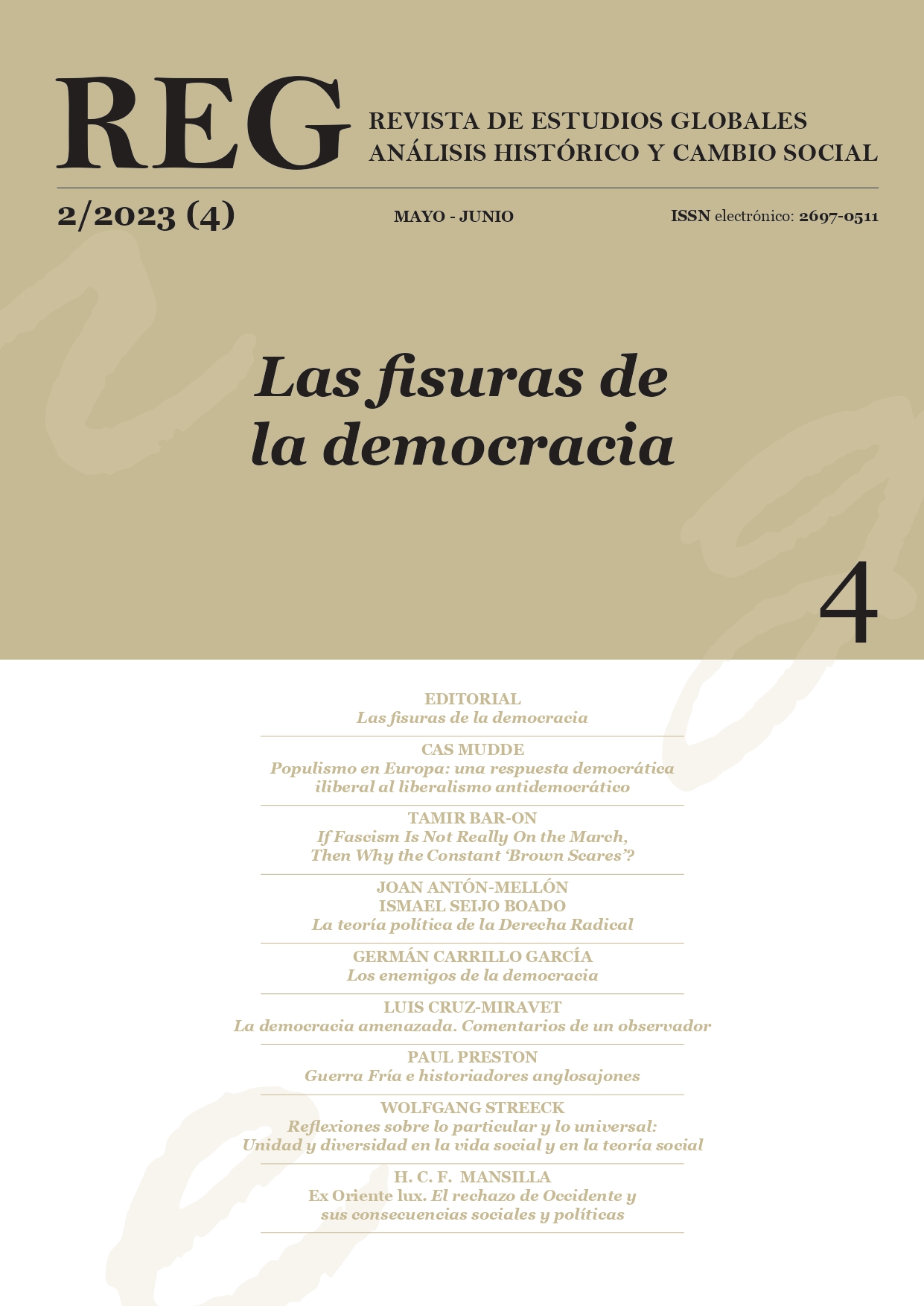Populismo en Europa: una respuesta democrática iliberal al liberalismo antidemocrático
Resumen
En esta conferencia, expongo mi enfoque sobre populismo, que se inscribe en el "enfoque ideacional" hoy dominante; discuto la compleja relación entre populismo y política, e identifico algunas de las principales causas del actual “populist Zeitgeist”. Mis principales argumentos son los siguientes: primero, aunque el populismo está relacionado con "crisis" (reales y percibidas), estas supuestas "crisis" son a menudo catalizadores más que causas principales del auge del populismo; segundo, el populismo es esencialmente una respuesta democrática no liberal al liberalismo no democrático; y tercero, el populismo sólo puede superarse con más democracia liberal y no con menos. Ilustro mis argumentos basándome en el reciente auge del populismo en Europa, pero creo que también son válidos en gran medida más allá de ese contexto regional y temporal específico.
Descargas
Métricas
-
Resumen942
-
pdf538
Citas
Aberbach, J., Putnam, R. D., and Brockman, B. (1981). Bureaucrats and Politicians in Western Democracies. Cambridge, MA: Harvard University Press.
Abts, K., & Rummens, S. (2007). Populism Versus Democracy. Political Studies, 55(2), 405-422.
Alonso-Muñoz, L., & Casero-Ripollés, A. (2018). Communication of European Populist Leaders on Twitter: Agenda Setting and the ‘More is Less’ Effect. El Profesional de la Información, 27(6), 1193-1202.
Aslanidis, P. (2016). Is Populism an Ideology? A Refutation and a New Perspective. Political Studies, 64(1), 88-104.
Baglioni, A. (2016). The European Banking Union: A Critical Assessment. London: Palgrave Macmillan.
Betz, H.G. (2021). Coronavirus-19’s Victims: Populism. En T. Bar-On, & B. Molas (eds.), Radical Right-Wing Responses to COVID-19. Stuttgart: Ibidem, forthcoming.
Betz, H. G (1994). Radical Right-Wing Populism in Western Europe. Basingstoke: Macmillan.
Borchert, J. & Zeiss, J. (2003). The Political Class in Advanced Societies: A Comparative Handbook. Oxford: Oxford University Press.
Borriello, A. & Jäger, A. (2021). The Antinomies of Ernesto Laclau: A Reassessment. Journal of Political Ideologies, FirstView.
Bro, P. & Wallberg, F. (2014). Gatekeeping in a Digital Era: Principles, Practices and Technological Platforms. Journalism Practice, 9(1), 92-105.
Bruno, V. A. & Downes, J. F. (2021). COVID-19 and the (Temporary) Fall of the Populist Radical Right in European Politics? En T. Bar-On, & B. Molas (eds.), Radical Right-Wing Responses to COVID-19. Stuttgart: Ibidem, forthcoming.
Canovan, M. (1999). Trust the People! Populism and the Two Faces of Populism. Political Studies, 47(1), 2-16.
Canovan, M. (1981). Populism. London: Harcourt Brace Jovanovich.
Capoccia, G. (2005). Defending Democracy: Reactions to Extremism in Interwar Europe. Baltimore: Johns Hopkins University Press.
Crouch, C. (2000). Post-Democracy. Cambridge: Polity.
Dancygier, D. (2017). Dilemmas of Inclusion: Muslims in European Politics. Princeton: Princeton University Press.
De Dijn, A. (2020). Freedom: An Unruly History. Cambridge, MA: Harvard University Press.
De Vries, C. (2018). Euroscepticism and the Future of Europe. Oxford: Oxford University Press.
Diamond, L. (2003). Defining and Defending Democracy. En R. A. Dahl, I. Shapiro, & J. A. Cheibub (eds.) The Democracy Sourcebook. Cambridge, MA: MIT Press.
Elçi, E. (2021) Politics of Nostalgia and Populism: Evidence from Turkey. British Journal of Political Science, forthcoming.
Ellinas, A. A. (2010). The Media and the Far Right in Western Europe: Playing the Nationalist Card. Cambridge: Cambridge University Press. Engesser, S., Ernst, N., Esser, F. & Büchel, F. (2017). Populism and Social Media: How Politicians Spread a Fragmented Message. Information, Communication & Technology, 20(8), 1109-1125.
Freeden, M. (2017). After the Brexit Referendum: Revisiting Populism as an Ideology. Journal of Political Ideologies, 22(1), 1-11.
Freeden, M. (1998). Is Nationalism a Distinct Ideology? Journal of Political Ideology, 46(4), 748-765.
Garcia-Guadilla, M. P & Mallen, A. (2019). Polarization, Participatory Democracy, and Democratic Erosion in Venezuela’s Twenty-First Century Socialism. The ANNALS of the American Academy of Political and Social Science, 681(1), 62-77.
Gellner, E. & Ionescu, G. (ed.) (1970). Populism: Its Meanings and National Characteristics. London: Weidenfeld & Nicolson.
Gerbaudo, P. (2018). Social Media and Populism: An Elective Affinity. Media, Culture & Society, 40(5), 745-753.
Gerbaudo, P. (2020). Coronavirus Embarrassed Trump and Bolsonaro. But the Global Right Will Fight Back, The Guardian. Disponible en: www.theguardian.com/commentisfree/2020/apr/01/populist-right-coronavirus (consultado el 3 de febrero de 2020).
Greskovits, B. (1998). The Political Economy of Protest and Patience: Easy European and Latin American Transformations Compared. Budapest: Central European University Press.
Hawkins, K. A. & Rovira Kaltwasser, C. (2017). The Ideational Approach to Populism. Latin American Research Review, 52(4), 513-528.
Held, J. (ed.) (1996). Populism in Eastern Europe: Racism, Nationalism, and Society. New York: East European Monographs.
Hooghe, L. & Marks, G. (2009). A Postfunctionalist Theory of European Integration: From Permissive Consensus to Constraining Dissensus. British Journal of Political Science, 39(1), 1-23.
Howarth, D. & Quaglia, L. (2016). The Steep Road to European Banking Union: Constructing the Single Resolution Mechanism, Journal of Common Market Studies, 52 (Annual Review), 125-140.
Kittilson, M. C. (2006). Challenging Parties, Changing Parliaments: Women and Elective Office in Contemporary Western Europe. Columbus, OH: The Ohio State University Press.
Kriesi, H. (2020). Is There a Crisis of Democracy in Europe? Politische Vierteljahresschrift, 61, 237-260.
Kriesi, H. & Pappas, T. (eds.) (2015). European Populism in the Shadow of the Great Recession. Colchester: ECPR Press.
Laclau, E. (1977). Politics and Ideology in Marxist Theory: Capitalism, Fascism, Populism. Atlantic Heights, NJ: Humanities Press.
Laclau, E. (2005). On Populist Reason. London: Verso.
Lijphart, A. (1977). Democracy in Plural Societies: A Comparative Exploration. New Haven, CT: Yale University Press.
Lipset, S. M. (1959). Some Social Requisites of Democracy: Economic Development and Political Legitimacy. American Political Science Review, 53(1), 69-105.
Lipset, S. M. (1960). Political Man: The Social Bases of Politics. New York: Anchor.
Lipset, S. M. (1955). The Radical Right: A Problem for American Democracy. British Journal of Sociology, 6(2), 176-209.
Maiguashca, B. (2019). Resisting the ‘Populist Hype’: A Feminist Critique of a Globalizing Concept. Review of International Studies, 45(5), 768-785.
Mair, P. (2013). Ruling the Void: The Hollowing of Western Democracy. London: Verso.
Mazzoleni, G. (2008). Media Logic. En W. Donsbach (ed.). The International Encyclopedia of Communication. John Wiley & Sons.
Mazzoleni, G., Stewart, J., & Horsfield, B. (eds.) (2003). The Media and Neo-Populism: A Contemporary Comparative Analysis. Westport, CT: Praeger.
Meyer, B. (2020). Pandemic Populism: An Analysis of Populist Leaders’ Responses to Covid-19. London: Tony Blair Institute for Global Change.
Michalis, M. (2013). Thirty Years of Private Television in Europe - Trends and Key Moments. En K. Donders, C. Pauwels & J. Loisen (eds). Private Television in Western Europe. London: Palgrave Macmillan.
Moffitt, B. (2016). The Global Rise of Populism: Performance, Political Style, and Representation. Redwood City, CA: Stanford University Press.
Moffit, B. (2020). Populism. Cambridge: Polity.
Mosca, L. & Tronconi, F. (2019). Beyond Left and Right: The Eclectic Populism of the Five Star Movement. West European Politics, 42(6), 1258-1283.
Mouffe, C. (2019). For a Left Populism. London: Verso.
Mouffe, C. (2000). The Democratic Paradox. London: Verso.
Mudde, C. (2004). The Populist Zeitgeist, Government and Opposition, 39(4), 541-563.
Mudde, C. (2016). On Extremism and Democracy in Europe. London: Routledge.
Mudde, C. (2017). An Ideational Approach. En C. Rovira Kaltwasser, P. Taggart, P. Ochoa Espejo & P. Ostiguy (eds.). The Oxford Handbook on Populism. Oxford University Press.
Mudde, C. (2019). The 2019 EU Elections: Moving the Center. Journal of Democracy, 30(4), 20-34.
Mudde, C. (2021). Populism and Constitutionalism: Theory and Practice. En N. Holtug & E. Uslaner (eds.) National Values and Social Cohesion. Colchester, UK: ECPR Press, forthcoming.
Mudde, C. & Rovira Kaltwasser, C. (2017). Populism: A Very Short Introduction. Oxford University Press.
Müller, J. W. (2020). Why Do Rightwing Populist Leaders Oppose Experts. The Guardian. Disponible en: www.theguardian.com/commentisfree/2020/mar/26/rightwing-populist-leaders-oppose-experts-not-elites (consultado el 5 de febrero de 2021).
Müller, J. W. (2016). What Is Populism? Philadelphia: University of Pennsylvania Press.
Norris, P. (1999). Recruitment in the European Parliament. En R. S. Katz & B. Wessels (eds.). The European Parliament, the National Parliaments, and European Integration. Oxford University Press.
ODIHR (2018). Hungary: Parliamentary Elections 8 April 2018. Warsaw: OSCE ODIHR.
Parsons, C., & Weber, T. (2011). Cross-Cutting Cleavages and Party Strategy in the European Union. Comparative Political Studies, 44(4), 383-411.
Palonen, E. (2018). Performing the Nation: The Janus-Faced Populist Foundations of Illiberalism in Hungary. Journal of Contemporary European Studies, 26(3), 308-321.
Radaelli, C. M. (2013). Technocracy in the European Union. London: Routledge.
Reilly, K. (2016). Read Hillary Clinton’s ‘Basket of Deplorables’ Remarks About Donald Trump Supporters. Time. Disponible en: https://time.com/4486502/hillary-clinton-basket-of-deplorables-transcript (consultado el 12 de diciembre de 2020).
Rovira Kaltwasser, C., Taggart, P., Ochoa Espejo, P., & Ostiguy, P. (2017a). Populism: An Overview of the Concept and the State of the Art. En C. Rovira Kaltwasser, P. Taggart, P. Ochoa Espejo & P. Ostiguy (eds.) (2017). The Oxford Handbook on Populism. Oxford University Press.
Rovira Kaltwasser, C., Taggart, P., Ochoa Espejo P. & Ostiguy, P. (eds.) (2017b). The Oxford Handbook on Populism. Oxford University Press.
Schumpeter, J. (1956). Capitalism, Socialism and Democracy. New York: Harper and Row.
Stavrakakis, Y., Katsambekis, G., Kioupkiolos, A., & Siomos, T. (2018). Populism, Anti-populism and Crisis. Contemporary Political Theory, 17(1), 4-27.
Streeck, W. (2016). How Will Capitalism End? Essays on a Failing System. London: Verso.
Sultan, N. M. (2017). Election 2016: Trump’s Free Media Helped Keep Cost Down, But Fewer Donors Provided More of the Cash, OpenSecrets. Disponible en: https://www.opensecrets.org/news/2017/04/election-2016-trump-fewer-donors-provided-more-of-the-cash
Taggart, P. (2000). Populism. Buckingham: Open University Press.
Taggart, P. (2004). Populism and Representative Politics in Contemporary Europe. Journal of Political Ideologies, 9(3), 269-288.
Tumber, H. (1993). ‘Selling Scandal’: Business and the Media. Media, Culture & Society, 15(3), 345-361.
Uhlig, H. (2010). Euro Area Business Cycle Dating Committee: Determination of the 2009 Q2 through in Economic Activity. Disponible en: https://cepr.org/voxeu/columns/euro-area-business-cycle-dating-committee-determination-2009-q2-trough-economic (consultado el 5 de febrero de 2021).
Von Beyme, K. (1996). The Concept of Political Class: A New Dimension of Research on Elites? West European Politics, 19(1), 68-87.
Walgrave, S. & De Swet, K. (2004). The Making of the (Issues of the) Vlaams Blok, Political Communication, 21(4), 479-500.
Wettstein, M., Esser, F., Schulz, A., Wirz, D. S., & Wirth, W. (2018). News Media as Gatekeepers, Critics, and Initiators of Populist Communication: How Journalists in Ten Countries Deal with the Populist Challenge. The International Journal of Press/Politics, 23(4), 476-495.
Wihbey, J. Coleman, T.D. Joseph, K. Lazer, D. (2017). Exploring the Ideological Nature of Journalists’ Social Networks on Twitter and Associations with News Story Content, Proceedings of Data Science + Journalism @ KDD’17, Halifax, Nova Scotia, Canada.
Wike, P., Poushter, J., Silver, L., Devlin, K., Fetteroff, J., Castillo, A., & Huang, C. (2019). Gender Equality. Pew Research Center. www.pewresearch.org/global/2019/10/14/gender-equality-2 (consultado el 6 de febrero de 2021).
Wilson, K. (2020). Attitudes Toward LGBT People and Their Rights in Europe. Oxford Research Encyclopedia of Politics. Disponible en: oxfordre.com/politics/view/10.1093/acrefore/9780190228637.001.0001/acrefore-9780190228637-e-1335 (consultado el 6 de febrero de 2021).
Wojcik, S. & Hughes, A. (2019). Sizing Up Twitter Users, Pew Research Center. Disponible en: www.pewresearch.org/internet/2019/04/24/sizing-up-twitter-users (consultado el 5 de febrero de 2021).
Wondreys, J. & Mudde, C. (2021). Victims of the Pandemic? European Far-Right Parties and COVID-19. Nationalities Papers, forthcoming.
Wortman, R. (1967). The Crisis of Russian Populism. London: Cambridge University Press.
Ziblatt, D. (2017). Conservative Parties and the Birth of Democracy. New York: Cambridge University Press.
Derechos de autor 2023 Revista de Estudios Globales. Análisis Histórico y Cambio Social

Esta obra está bajo una licencia internacional Creative Commons Atribución-NoComercial-SinDerivadas 4.0.










